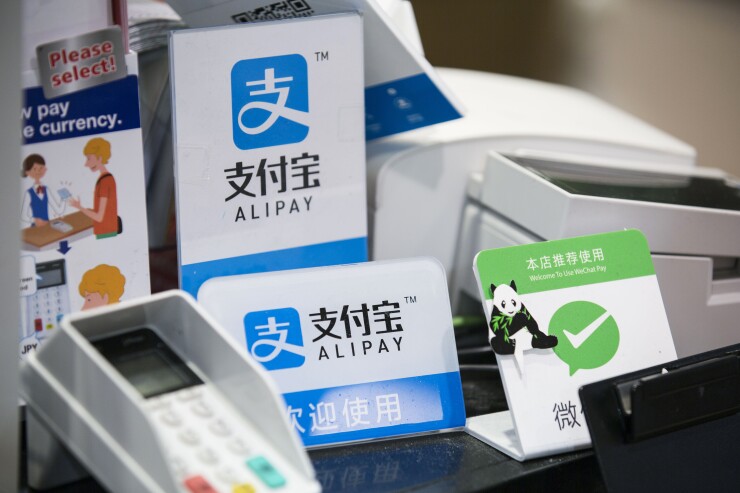The payments industry is getting pulled in two directions, as technology and e-commerce promise a borderless future for transactions while political forces apply the brakes.
China's
The regulator has taken a more protectionist stance in the Trump era, and while there are conditions that are unique to Ant and MoneyGram — such as the

"Given the importance of this deal for Ant Financial's growth in the U.S. market, there may be consequences for U.S. companies already operating in China and those looking to enter," said Sarah Grotta, director of the debit and alternative products advisory service at Mercator. "Deals could be halted and partnerships could be restricted as a direct response."
Ant and MoneyGram did not provide comment beyond their press release, though the two companies say they plan to collaborate on payments technology and financial inclusion without a direct ownership stake for Ant.
That's far from a defeat, since there's still a huge addressable market between the U.S. and China. Chinese payment companies such as Ant and WeChat, and the state-run UnionPay, have made numerous deals over the past couple of years to enable payments for Chinese travelers in the West, and for Chinese consumers wishing to make purchases from e-commerce sites worldwide.
The underlying payments technology is also improving.
The regulator that stood in the way of the Ant/MoneyGram deal operates mostly in private, though
"While the national security concern was a stretch, I supported the government blocking (the Ant/MoneyGram deal) as a tit for tat for China's flagrantly flouting its 2001 WTO commitment to open its domestic payments market," said Eric Grover, a principal at Intrepid Ventures.
That 2001 promise was supposed to make it easier for companies like Mastercard and Visa to offer domestic services in China as a way to bring more competition to the Chinese market.
But it hasn't worked out that way. Both
"There still hasn't been a single domestic Mastercard, Visa, Amex, Discover or PayPal transaction in China," Grover said. "In contrast, Alipay, CUP and WeChat Pay have unfettered access to the U.S. market."
While he agrees with the government's move, Grover did express some regret about the nixed deal, which would have given Ant an interesting mix of products.
"It would have given Alipay and potentially
The U.S. is close to "wide open" for foreign payment businesses, according to Grover. "It's also the most competitive payments market, so many foreign payments companies seeking overseas expansion will look elsewhere."
"This is driven by politics more than any other market forces."
There are other international deals involving U.S. payment firms that have progressed, such as Cincinnati-based Vantiv buying the U.K.-based
"This is driven by politics more than any other market forces. So of course, if we don’t let Chinese companies enter our markets, it may difficult for U.S. companies to enter Chinese markets," said Talie Baker, senior analyst at Aite Group.
The blocked Ant/MoneyGram deal highlights how the U.S. is looking more inward and thus may not be as welcoming to foreign firms, said Michelle Evans, an analyst at Euromonitor.
"The failed deal also indicates U.S. regulators are placing a greater emphasis on cybersecurity, particularly personal data that has traditionally not been associated with national security," Evans said. "This shift could have great ramifications on the purveyors of payments data whether the company is foreign or domestically owned."





